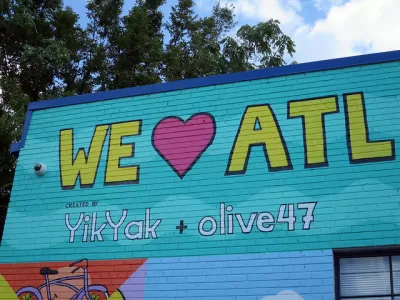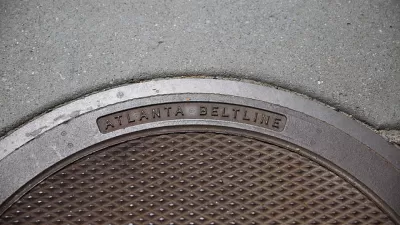All is not well at the Atlanta BeltLine Partnership, after two prominent board members, including Ryan Gravel, who originally proposed the idea for the BeltLine, resigned this week.

"Two prominent board members of the Atlanta BeltLine Partnership turned in their resignations Monday saying not enough emphasis is being given to the issues of equity and affordability," reports Maria Saporta. The Atlanta BeltLine Partnership is a public entity, controlled by the city of Atlanta, with responsibility for implementing the massive, ambitious project.
The two resigning board members were Ryan Gravel, "an urban planner to initially proposed the concept of the BeltLine in his Georgia Tech Master’s thesis," and Nathaniel Smith, "founder of the Partnership for Southern Equity," according to Saporta.
Gravel and Smith signed a resignation letter that included the following explanation for the bombshell: "While there have been success stories that we can be proud of, our coalition’s progress has not been commensurate with the scale of the challenges at hand." The letter also cited the example of $7.5 million recently allotted from TAD bonds, which "will likely support fewer than 200 affordable units out of ABI’s obligation to 5,600 – it is a drop in the bucket when compared to the need."
The article includes the full text from the resignation letter, as well as a public statement from Atlanta BeltLine Partnership Chair Mike Donnelly in response to the development.
FULL STORY: Ryan Gravel and Nathaniel Smith resign from BeltLine Partnership board over equity concerns

Alabama: Trump Terminates Settlements for Black Communities Harmed By Raw Sewage
Trump deemed the landmark civil rights agreement “illegal DEI and environmental justice policy.”

Study: Maui’s Plan to Convert Vacation Rentals to Long-Term Housing Could Cause Nearly $1 Billion Economic Loss
The plan would reduce visitor accommodation by 25% resulting in 1,900 jobs lost.

Why Should We Subsidize Public Transportation?
Many public transit agencies face financial stress due to rising costs, declining fare revenue, and declining subsidies. Transit advocates must provide a strong business case for increasing public transit funding.

Paris Bike Boom Leads to Steep Drop in Air Pollution
The French city’s air quality has improved dramatically in the past 20 years, coinciding with a growth in cycling.

Why Housing Costs More to Build in California Than in Texas
Hard costs like labor and materials combined with ‘soft’ costs such as permitting make building in the San Francisco Bay Area almost three times as costly as in Texas cities.

San Diego County Sees a Rise in Urban Coyotes
San Diego County experiences a rise in urban coyotes, as sightings become prevalent throughout its urban neighbourhoods and surrounding areas.
Urban Design for Planners 1: Software Tools
This six-course series explores essential urban design concepts using open source software and equips planners with the tools they need to participate fully in the urban design process.
Planning for Universal Design
Learn the tools for implementing Universal Design in planning regulations.
Smith Gee Studio
Alamo Area Metropolitan Planning Organization
City of Santa Clarita
Institute for Housing and Urban Development Studies (IHS)
City of Grandview
Harvard GSD Executive Education
Toledo-Lucas County Plan Commissions
Salt Lake City
NYU Wagner Graduate School of Public Service




























